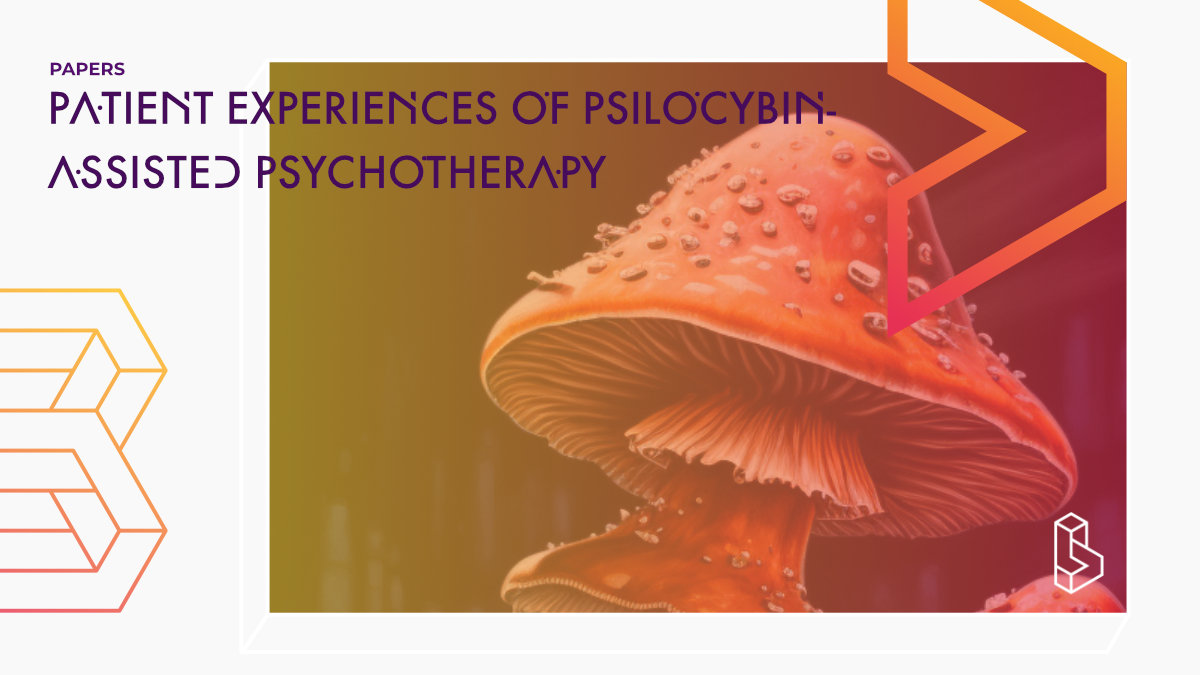This qualitative analysis of participants’ (n=13) accounts of their psilocybin experiences may help form new hypotheses on why a psychedelic experience works. The study finds that participants experienced strong emotions, partly conveyed by music.
Abstract of Patient Experiences of Psilocybin-Assisted Psychotherapy
“The psychological mechanisms of action involved in psilocybin-assisted psychotherapy are not yet well understood. Despite a resurgence of quantitative research regarding psilocybin, the current study is the first qualitative study of participant experiences in psilocybin-assisted psychotherapy. Semistructured interviews were carried out with 13 adult participants aged 22 to 69 years (M = 50 years) with clinically elevated anxiety associated with a cancer diagnosis. Participants received a moderate dose of psilocybin and adjunctive psychotherapy with an emphasis on the process of meaning-making. Verbatim transcribed interviews were analyzed by a five-member research team using interpretative phenomenological analysis. General themes found in all or nearly all transcripts included relational embeddedness, emotional range, the role of music as a conveyor of experience, meaningful visual phenomena, wisdom lessons, revised life priorities, and a desire to repeat the psilocybin experience. Typical themes found in the majority of transcripts included the following: exalted feelings of joy, bliss, and love; embodiment; ineffability; alterations to identity; a movement from feelings of separateness to interconnectedness; experiences of transient psychological distress; the appearance of loved ones as guiding spirits; and sharing the experience with loved ones posttreatment. Variant themes found in a minority of participant transcripts include lasting changes to sense of identity, synesthesia experiences, catharsis of powerful emotion, improved relationships after treatment, surrender or “letting go,” forgiveness, and a continued struggle to integrate the experience. The findings support the conclusion that psilocybin-assisted psychotherapy may provide an effective treatment for psychological distress in cancer patients. Implications for theory and treatment are discussed.”
Authors: Alexander B. Belser, Gabrielle Agin-Liebes, T. Cody Swift, Sara Terrana, Neşe Devenot, Harris L. Friedman, Jeffrey Guss, Anthony Bossis & Stephen Ross
Notes on Patient Experiences of Psilocybin-Assisted Psychotherapy
This study builds on the work of Ross et al. (2016) where patients with life-threatening cancer were given psychotherapy (with psilocybin, double-blind, placebo-controlled).
Another more in-depth analysis of four patients was done by Ross and colleagues (2018).
And continued themes after the experience were also analysed (from the same dataset) in Swift and colleagues (2017).

Summary of Patient Experiences of Psilocybin-Assisted Psychotherapy
Psilocybin-assisted psychotherapy is not yet well understood, but 13 adult participants with clinically elevated anxiety associated with a cancer diagnosis participated in a qualitative study.
In the past 15 years, quantitative research has been conducted on the safety and efficacy of hallucinogens and psychedelics, including psilocybin, a naturally occurring serotonergic compound found in over 180 species of mushrooms.
In a double-blind placebo-controlled randomized trial, moderate to high-dose psilocybin was administered to patients with cancer and concomitant anxiety and depression. The patients experienced rapid, substantial, and enduring decreases in depression and anxiety, as well as improvements in cancer-related demoralization and hopelessness, spiritual well-being, and quality of life.
Find this paper
https://doi.org/10.1177/0022167817706884
Open Access | Google Scholar | Backup | 🕊
Cite this paper (APA)
Belser, A. B., Agin-Liebes, G., Swift, T. C., Terrana, S., Devenot, N., Friedman, H. L., ... & Ross, S. (2017). Patient experiences of psilocybin-assisted psychotherapy: an interpretative phenomenological analysis. Journal of Humanistic Psychology, 57(4), 354-388.
Study details
Compounds studied
Psilocybin
Topics studied
Anxiety
Depression
Palliative Care
Study characteristics
Original Re-analysis
Placebo-Controlled
Double-Blind
Follow-up
Interviews
Qualitative
Participants
13
Humans
Compound Details
The psychedelics given at which dose and how many times
Psilocybin 21 mg | 1xLinked Research Papers
Notable research papers that build on or are influenced by this paper
Rapid and sustained symptom reduction following psilocybin treatment for anxiety and depression in patients with life-threatening cancer: A randomized controlled trialThis double-blind placebo-controlled study (n=29) for those suffering from anxiety and depression, related to cancer, improved significantly (60-80% of participants) after a single dose of psilocybin (21mg/70kg) in combination with psychotherapy.
Individual Experiences in Four Cancer Patients Following Psilocybin-Assisted Psychotherapy
This case study describes patients (n=4) from a randomized, double-blind, placebo-controlled trial investigating single-dose psilocybin (21mg/70kg) psychotherapy to treat cancer-related anxiety and depression. These four participants’ personal narratives extended beyond the cancer diagnosis itself, frequently revolving around themes of self-compassion and love, acceptance of death, and memories of past trauma.
Cancer at the dinner table: experiences of psilocybin-assisted psychotherapy for the treatment of cancer-related distress
This interview study (n=13) analyzed the phenomenological themes associated with psilocybin therapy for anxiety and depression associated with cancer. Participants reported a felt reconnection to life, reconciliation with death, and other powerful subjective effects.
Linked Clinical Trial
Psilocybin Cancer Anxiety StudyThe primary objective of this double-blind, placebo-controlled pilot study is to assess the efficacy of psilocybin administration (4-phosphoryloxy-N,N-dimethyltryptamine), a serotonergic psychoactive agent, on psychosocial distress, with the specific primary outcome variable being anxiety associated with cancer. Secondary outcome measures will look at the effect of psilocybin on symptoms of pain perception, depression, existential/psychospiritual distress, attitudes towards disease progression and death, quality of life, and spiritual/mystical states of consciousness.

